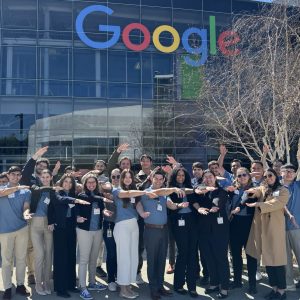AI Q&A with Diana Meditz
As AI Product Manager in BNY Mellon’s AI Hub, Diana Meditz (BSBA ’09) has been on the forefront of the AI explosion. Hear how she has seen AI evolve, how she works with it every day and why educating business students on AI is a priority.
Q: What are your responsibilities in this role?
Meditz: “In my role as an AI Product Manager, I am the pivotal link between business operations and data scientists. I lead complex AI projects, including defining the requirements for our solutions, ensuring that the developed solutions are valuable and practical for the business. Ultimately, my primary goal remains to shape and deliver AI solutions that yield substantial commercial value.
“Additionally, a central aspect of my role involved demystifying AI concepts across the organization. By translating complex AI capabilities into understandable terms, I empower employees to envision the potential applications of AI in their daily work. It’s crucial for everyone in the organization to grasp the art of the possible, and I take on the responsibility of keeping them informed about the latest AI advancements, including technologies like ChatGPT. This continuous culture fosters a culture of innovation and exploration.”
Q: How do you work with AI today?
Meditz: “I’m immersed in the world of AI every single day – it’s an exciting part of my routine. I’m lucky to collaborate closely with data scientists who write the algorithms driving our AI models. This partnership allows us to tackle intricate challenges tailored to our organization.
“In the financial sector, the AI landscape is vast. We’re talking about anything from spotting fraud and predicting events to enhancing client experiences and streamlining those time-consuming tasks. This affords me the opportunity to work on a variety of projects that require these different AI capabilities. And looking ahead, things are only getting more interesting. With advancements like generative, which you might have heard of as ChatGPT, the possibilities for transforming the way we work are enormous. It’s really an exciting time to be part of this evolving field.”
Q: How have you seen AI evolve over your career?
Meditz: “Looking back on the past 10+ years, the evolution of AI has been nothing short of incredible. It’s moved from a buzzword to an everyday reality. When I started my career, imagining AI as something accessible to everyone was a far stretch, let alone picturing myself working in AI! Just think about it: AI chatbots only became trendy in the 2010s, IBM’s Watson outsmarted Ken Jennings on Jeopardy in 2011, and Apple introduced facial recognition on iPhones in 2017.
“Historically, AI development required significant investment – from expert-level resources to computing power. Over the past decade, AI has become increasingly democratized with companies like Microsoft, Google and Amazon, developing tools and frameworks for businesses to use without extensive investment. And today, AI is practically woven into every single thing you do. Those smart, digital experiences you enjoy in your personal life have become the standard for what you expect from your professional experiences. And this will trend will continue to pick up with the rise of Generative AI.
Q: Why is AI education important?
Meditz: “I believe AI education is critical for anyone coming into the workforce. AI is completely revolutionizing the way we work and the types of roles that will exist in the future. Think about it this way: AI isn’t just about coding or complex algorithms; it’s a game changer that can supercharge decision-making and innovation across industries, including financial services.
“In the business world, AI helps us sift through massive amounts of data to uncover insights that might otherwise remain hidden. Imagine being able to predict customer preferences, optimize supply chains, or even forecast market trends with remarkable accuracy. These abilities translate into smarter strategies, more informed decision making and a competitive edge.
“Moreover, AI tools can automate repetitive tasks, freeing up time for higher level thinking and creativity. This means the entry level roles from the past will no longer be mundane data entry, rather strategic problem solving. In a world where innovation and efficiency drive success, AI literacy becomes a vital skill. It opens doors to careers that are shaping the future in all industries.”




